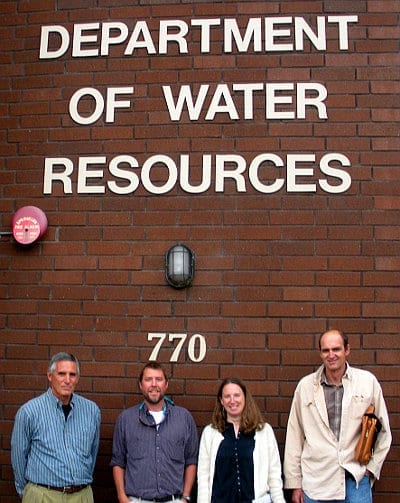CalTrout Diving Deeper into Integrated Regional Water Management
by Mark Drew, PhD, Eastern Sierra Region Manager
The City of Los Angeles depends on the Eastern Sierra for between 40-50% of their annual water supply. Likewise, fisheries of the Eastern Sierra are dependent on an adequate, quality water supply from this region, without which they would perish.
Unfortunately, overexploitation of natural resources (at the state level) to meet urban water demands is threatening:
- The health of Sierra Nevada ecosystems critical to imperiled native trout fisheries
- The quality of water that serves the Eastern Sierra’s disadvantaged communities
Given these conflicting needs, integrated water resources planning is essential for the long-term sustainability of such demands.
California’s Department of Water Resources’ (DWR) Integrated Regional Water Management Program was formed as a means to promote regional planning efforts throughout California.
Through Prop 84 (2006), DWR funds projects that address the following categories/issues:
- Providing adequate water supplies and stream flows
Improving water quality - Maintaining/restoring healthy ecosystems that are vital to watersheds and the
fisheries they support
In 2008, CalTrout initiated the Inyo-Mono Integrated Regional Water Management Planning process which geographically covers 11% of the state. Since then, CalTrout led the development and implementation of an Integrated Regional Water Management Program (I-M IRWMP) — the first ever for this region.

Inyo-Mono reps meeting with DWR staff
In addition, we recently coordinated and submitted a proposal to the DWR that included 15 discrete projects that address priority water needs for the region.
This past February, CalTrout was awarded a grant from DWR totaling $331,000 in support of the I-M IRWMP effort, and more recently, Mark Drew, CalTrout Region Manager and Director of I-M IRWMP, was invited to speak at the first ever State-Integrated Regional Water Management Conference and at a National Watershed
Conference on principles of successful integrated water resources management.
Building on that momentum, CalTrout and the RWMG has been awarded one of only five state-wide grants aimed at engaging and empowering economically disadvantaged communities to more effectively manage regional water resources.
A two year grant worth $371,000 will build regional capacity in areas such as Lone Pine (Owens River) and the Walker/Antelope Valley area (Walker River) and in turn, help maintain rivers and waterways within the Eastern Sierra region.
In the coming year, CalTrout will provide continued leadership necessary to further implement the existing plan and coordinate priority projects. In doing so, watersheds and fisheries throughout the Eastern Sierra will benefit.




